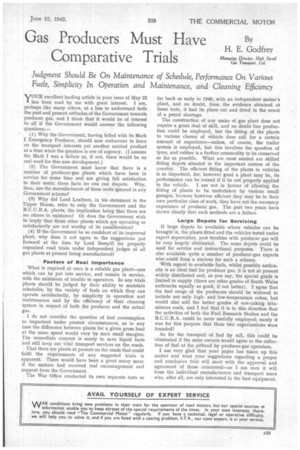Gas Producers Must Have Comparative Trials
Page 25

If you've noticed an error in this article please click here to report it so we can fix it.
Judgment Should Be On Maintenance of Schedule, Performance On Various Fuels, Simplicity In Operation and Maintenance, and Cleaning Efficiency
By H. E. Godfrey
Managing Director, High Stxed Gas Transport. Ltd.
YOUR excellent leading article in your issue of May 22 has been read by me with great interest. I am, perhaps like many others, at a loss to understand both the past and present attitudes of the Government towards producer gas, and I think that it would be of interest to all if the Government would answer the following questions:— (1) Why the Government, having failed with its Mark I Emergency Producer, should now endeavour to force on the transport interests yet another untried product at a time when the question is one of urgency. (I assume the Mark I was a failure as, if not, there would be no real need for this new development.)
(2) The Government must know that there is a number of producer-gas plants which have been in service for some time and are giving full satisfaction to their users; these facts no one can dispute. Why, then, are the manufacturers of these units ignored in any Government scheme?
(3) Why did Lord Leathers, in his statement in the Upper House, refer to only the Government and the B.C.U.R.A. plants, the implication being that there are no others in existence? Or does the Government wish to imply that those other plants which are operating so satisfactorily are not worthy of its consideration?
(4) If the Government be so confident of its improved plant, why does it not agree to the suggestions put forward at the time by Lord Sempill for properly organized road trials under independent judges of all gas plants at present being manufactured?
Factors of Real Importance What is required at once is a reliable gas plant—one which can be put into service, and remain in service, with the minimum of trouble to operators. In any trials plants should be judged by their ability to maintain schedules, by the variety of fuels on which they can operate satisfactorily, by simplicity in operation and maintenance and by the efficiency of their cleaning system in respect of both the producer and the actual gas.
I do not consider the question of fuel consumption so important under present circumstances, as in any ease the difference between plants for a given gross load at the same speed would vary by such small margins. The immediate concern is surely to save liquid fuels and still keep our vital transport services on the roads.
That there are plants at present on the roads that could fulfil the requirements of any suggested trials is apparent. There would have been a great many more if the makers had received real encouragement and support from the Government.
The War Office conducted its own separate tests so far back as early in 1940, with an independent maker's plant, and no doubt, from , the evidence obtained at these tests, it had its plans cut and dried in the event of a petrol shortage.
The construction of any make of gas plant does not require a great deal of skill, and no doubt line production could be employed, but the fitting of the plants to various classes of vehicle does call for a certain amount of experience—unless, of course, the trailer system is employed, but this involves the question of tyres, and rubber is a further commodity to be conserved so far as possible. What are most needed are skilled fitting depots situated in the important centres of the country. The efficient fitting of the plants to vehicles is so important, for, however good a plant may be, its performance can be ruined if it be not properly applied to the vehicle. I am not in favour of allowing the fitting of plants to be undertaken by various small garages, because however efficient they may be in their own particular class of work, they have not the necessary experience of producer gas. The past two years have shown clearly that such methods are a failure.
Large Depots for Servicing
If large depots be available where vehicles can be brought in, the plats fitted and the vehicles tested under expert supervision, past troubles with producer gas will be very largely eliminated. The same depots could be used for service and instructional purposes. There is also available quite a number of producer-gas experts who could form a nucleus for such a scheme.
With regard to available fuels, whilst possibly anthracite is an ideal fuel for producer gas, it is not at present widely distributed and, as you say, the special grade is limited in supply (there are other grades of South Wales anthracite equally as good, if not better). I agree that -the fuel range of the producers should be widened to include not only highand low-temperature cokes, but would also add the better grades of non-caking bituminous coals, and I feel that it is in this direction that the activities of both the Fuel Research Station and the B.C.U.R.A. could be more usefully employed; surely it was for this purpose that these two organizations were founded?
As for the transport of fuel by rail, this could be eliminated if the mine owners would agree to the collection of fuel at the pithead by producer-gas operators.
I am very glad that your paper has taken up this matter and trust your suggestions regarding a proper and conclusive trial will meet with the approval and agreement of those concerned—as I am sure it will from the individual manufacturers and transport users who, after all, are only interested in the best equipment.




















































